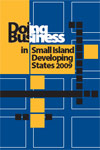Overview
- For the first time, Doing Business narrows its focus to analyze 38 landlocked economies in Doing Business in Landlocked Economies 2009. Based on data from the global Doing Business project, the new study finds that landlocked economies underperform, as a group, in 7 out of 10 Doing Business indicators. Yet the group outperforms coastal economies in the areas of registering property, enforcing contracts and employing workers.
- Landlocked economies face special challenges due to their geography. Trade often involves greater distances, and border crossings offer their own obstacles. However, the quality of a nation’s business regulatory environment is within its control. Transparent and efficient regulations can encourage entrepreneurs and facilitate private-sector business activity, according to Doing Business research.
Main Findings
- Many landlocked economies are reforming to instigate private-sector-lead growth—particularly within Central Asia. In fact, Azerbaijan was a top Doing Business reformer in 2007/2008 with new reforms in 7 out of 10 indicators. Azerbaijan currently occupies the number 3 position among landlocked economies—following OECD nations Switzerland (number 1) and the Czech Republic (number 2).
- In landlocked economies, it takes an average of 267 days to go through all the procedures to legally build a simple warehouse—50 days more than in coastal economies.
- Many landlocked economies collateral and bankruptcy laws provide only weak legal rights for borrowers and lenders, limiting the ability of banks to lend to businesses.
- Credit bureaus are lacking in 1 of every 3 landlocked economies. Where they do exist, the coverage of borrowers is low.

